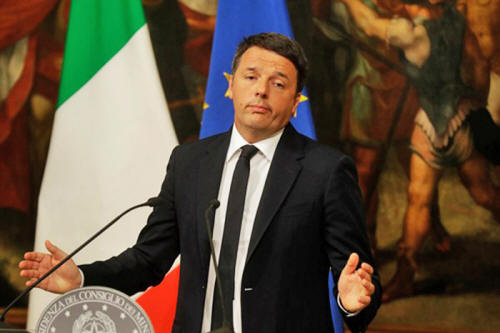|
December 08, 2016 from WPR Website
speaks at a press conference, Rome, Italy, Dec. 5, 2016 (AP photo by Gregorio Borgia)
Italian Prime Minister Matteo Renzi resigned Wednesday after nearly 60 percent of voters rejected a referendum Sunday on a series of changes to the constitution that Renzi had staked his premiership on.
The referendum's failure and the
resignation of the brash prime minister have plunged Italy into
political and economic uncertainty, leading many to speculate about
Italy's future in the Eurozone and the strength of populist
movements across Europe.
But for many Italians, the referendum was a way to air their grievances with Renzi and his coalition's failure to deliver on campaign promises, including reducing unemployment and increasing economic growth.
She adds that anti-establishment forces were able to convince the electorate,
Mark Gilbert, a WPR contributor and professor at Johns Hopkins School of Advanced International Studies Europe, based in Bologna, says in an email that the referendum,
With Renzi stepping aside, Italian President Sergio Mattarella has started the process of forming a caretaker government; a new prime minister could be announced as early as this weekend.
Lawmakers from all parties are calling for early elections, which are currently scheduled for spring 2018, to stave off a deeper political crisis.
A technocratic caretaker
government would face similar problems to those of the
government of former Prime Minister Mario Monti, who led a
government of technocrats from 2011 until 2013 in the wake of the
financial crisis but lacked a democratic mandate to institute needed
reforms.
Padoan is a better choice, according to Silvia Francescon, since he,
The referendum results put Italy's already-unstable banking sector, which is saddled with billions in questionable loans, at an even greater risk.
Stocks in Italian banks have fallen, and there are serious questions about the future of a planned $5 billion bailout of Monte dei Paschi di Siena, one of the banks at the center of Italy's banking crisis.
Seven other banks
are also at risk of collapse if markets don't stabilize.
If no party reaches the 40-percent
threshold, the two biggest parties participate in a second-round
vote.
For many in Brussels,Renzi "was a wall against populists."
Italy's populist Five Star Movement, or M5S, led by the comedian Beppe Grillo, is hoping to capitalize on the political instability.
The M5S is polling neck-and-neck with Renzi's Democratic Party and would benefit the most if new elections are held quickly, thanks in large part to the new election law.
It is also in M5S' interest for national elections to be called before the political crisis in Rome gets any worse, since many wonder how much longer the city's embattled mayor, M5S' Virginia Raggi, can stay in power without damaging her party.
Renzi's Democratic Party faces an uncertain future.
Even if a technocratic government is
formed in Rome, the M5S is in the perfect position to criticize an
un-elected government, which it would no doubt frame as elites
beholden to Brussels, while presenting itself as the party of real
change before the next elections are held.
Between former Prime Minister Silvio Berlusconi's center-right Forza Italia party, the M5S and the far-right Northern League, nearly half of all Italians support a populist party, according to Francescon.
For many in Brussels, Renzi,
Of particular concern in Brussels is M5S' promise to hold a referendum on leaving the Eurozone and reinstating the lira as Italy's currency.
Dropping the common currency,
A referendum, he added, would,
Renzi's commitment to reform in Italy had won him respect across Europe, if not at home, and helped to change the perception of Italy as one of the EU's biggest so-called slackers.
But now Italy's entire reform agenda is in doubt, and the next government, whether it is technocratic or led by the M5S,
The full political and economic fallout of Renzi's failed referendum may take time to emerge.
Renzi's referendum wasn't BREXIT, but it was still another victory for a populist party in Europe.
Could France be next...?
|


